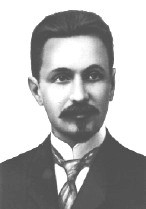Boris Rosing
This article needs additional citations for verification. (December 2008) |

Boris Lvovich Rosing (Template:Lang-ru) (April 23, 1869 – April 20, 1933) was a Russian scientist and inventor in the field of television.[1]
Biography
Rosing had Dutch roots on his father's side, his mother was Russian. He first envisioned a Television system using the CRT on the receiving side in 1907. Rosing filed a patent application in Germany on November 26, 1907 and—on the improved version of his system—on March 2, 1911. He followed up with a demonstration of which a report was published in the Scientific American with diagrams and full description of the invention's operation.[2]
Rosing's invention expanded on the designs of Paul Nipkow and his mechanical system of rotating lenses and mirrors. Accordingly, Rosing's system employed a mechanical camera device, but used very early cathode ray tube (developed in Germany by Karl Ferdinand Braun) as a receiver. Rosing's Braun Tubes consisted of two parallel metal plates that were used to electrically shift the electron beam itself before it was scanned and reached the screen. These two plates were connected electrically to the photoelectric cell in the camera. Depending on the output of the photoelectric cells, the beam would be deflected up or down before entering the concentrating plate. Since this movement increased or decreased the number of electrons passing between the plates, it had the effect of varying the brightness of the electron beam. The system was primitive, but it was definitely one of the first experimental demonstrations where the cathode ray tube was employed for the purposes of television. [3] V. K. Zworykin, who pioneered television in the United States and Germany, was a pupil of Rosing and assisted him in some of his laboratory work.[4]
Rosing continued his television research until 1931 when he was exiled as a counter-revolutionary to Kotlas without right to work, but in 1932 was moved to Archangelsk where took up physics department of Forestry Institute. Rosing died in exile in 1933 of cerebral haemorrhage.
Notes
- ^ "The story of BBC Television - How it all began". BBC World Service.
- ^ "Boris Lvovich Rosing". Retrieved Oct 26, 2012.
- ^ Abramson, Albert. Zworykin, Pioneer of Television. Urbana: University of Illinois, 1995. Print.
- ^ "VLADIMIR K. ZWORYKIN (1889-1982)". M.I.T., The Lemelson Foundation. Retrieved Oct 26, 2012.
